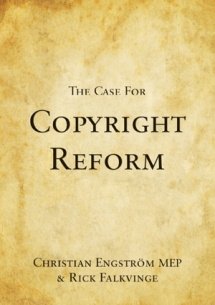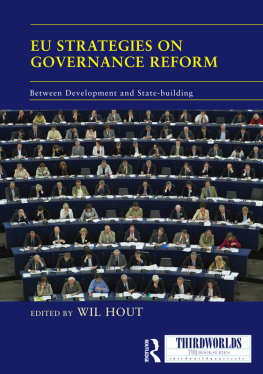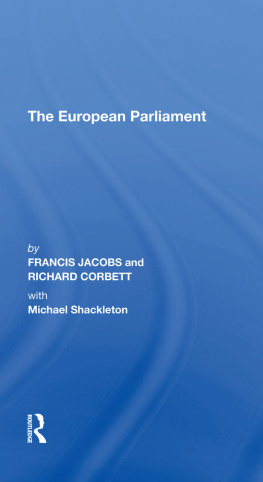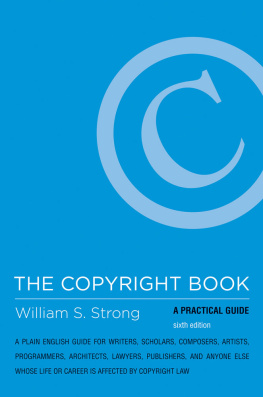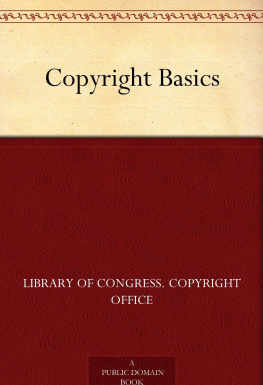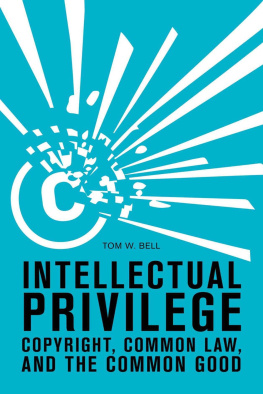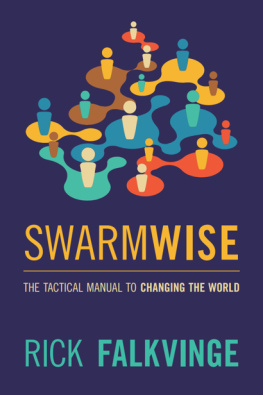The Case for Copyright Reform
by
Lars Christian Engstrm
2012
 All Your Books Are Belong To Us !
All Your Books Are Belong To Us ! http://c3jemx2ube5v5zpg.onion
The Case for Copyright Reform
Copyright 2012 Lars Christian Engstrm
This book is published by Pirate MEP Christian Engstrm
with support from the Greens/EFA-group in the European Parliament.
2012 No rights reserved Creative Commons CC0
This book also can be bought on paper from Lulu.com
Contact details:
Christian Engstrm: christianengstrom.wordpress.com
Rick Falkvinge: falkvinge.net
Greens/EFA in the EP: www.greens-efa.eu
Legalized file sharing, shorter protection times for the commercial copyright monopoly, free sampling and a ban on DRM.
These are the main points of the proposal for copyright reform that the Pirate Party is advocating and which the Greens/EFA group in the European Parliament adopted as its group position in September 2011.
This is a constructive alternative to the controversial ACTA agreement and to the criminalization of the entire generation of youths. This booklet explains why such a reform is both necessary and sustainable and will benefit both citizens and artists.
Contents
Chapter 1 : There Is A Better Way
Todays copyright legislation is out of balance, and out of tune with the times. It has turned an entire generation of young people into criminals in the eyes of the law, in a futile attempt at stopping technological development. Yet file sharing has continued to grow exponentially. Neither propaganda, fear tactics, nor ever harsher laws have been able to stop the development.
It is impossible to enforce the ban against non-commercial file sharing without infringing on fundamental human rights. As long as there are ways for citizens to communicate in private, they will be used to share copyrighted materials. The only way to even try to limit file sharing is to remove the right to private communication. In the last decade, this is the direction that copyright enforcement legislation has moved in, under pressure from big business lobbyists who see their monopolies under threat. We need to reverse this trend to safeguard fundamental rights.
At the same time, we want a society where culture flourishes, and where artists and creative people have a chance to make a living as cultural workers. Fortunately, there is no contradiction between file sharing and culture. This is something we know from a decades experience of massive file sharing on the Internet.
In the economic statistics, we can see that household spending on culture and entertainment is slowly increasing year by year. If we spend less money on buying CDs, we spend more on something else, such as going to live concerts. This is great news for artists. An artist will typically get 5-7% of the revenues from a CD, but 50% of the revenues from a concert. The record companies lose out, but this is only because they are no longer adding any value.
It may well be that it will become more difficult to make money within some parts of the cultural sector, but if so, it will become easier in some others including new ones, that we have not even imagined so far. But as long as the total household spending on culture continues to be on the same level or rising, nobody can claim that artists in general will have anything to lose from a reformed copyright.
Should this also have the side effect of loosening up some of the grip that the big distributors have over cultural life, then so much the better for both artists and consumers.
When public libraries were introduced in Europe 150 years ago, the book publishers were very much opposed to this. The argument they used was the same one that is being used today in the file sharing debate: If people could get access to books for free, authors would not be able to make a living, and no new books would be written.
We now know that the arguments against public libraries were wrong. It quite obviously did not lead to a situation where no new books were written, and it did not make it impossible for authors to earn money from writing. On the contrary, free access to culture proved to be not only a boon to society at large, but also turned out to be beneficial to authors.
The Internet is the most fantastic public library that has ever been created. It means that everybody, including people with limited economic means, has access to all the worlds culture just a mouse-click away. This is a positive development that we should embrace and applaud.
The Pirate Party has a clear and positive agenda to end criminalization of the young generation, and provide the foundation for a diverse and sustainable cultural sector in the Internet age. We invite all political groups to copy our ideas.
Sharing is caring.
Chapter 2 : A Constructive Proposal For Copyright Reform
The Pirate Party does not want to abolish copyright; we want to reform it. We want to keep copyright for commercial purposes, but we want to set all non-commercial copying and use free.
This reform is urgent, as the attempts to enforce todays ban on non-commercial sharing of culture between private citizens are threatening fundamental rights, such as the right to private communication, freedom of information, and even the right to due process.
File sharing is when two private individuals send ones and zeros to each other. The only way to even try to limit file sharing, is to introduce surveillance of everybodys private communication. There is no way to separate private messages from copyrighted material without opening the messages and checking the contents. Gone is the postal secret, the right to communicate in private with your lawyer or your web-cam flirt, or your whistle-blower protection if you want to give a sensitive story to a journalist.
We are not prepared to give up our fundamental rights to enforce todays copyright. The right to privacy is more important than the right of big media companies to continue to make money in the same way as before, because the latter right does not even exist.
Todays copyright also prevents or restricts many new and exciting cultural expressions. Sampled music on MySpace, remixes on YouTube, or why not a Wikipedia filled with lots of pictures and music in the articles? Copyright legislation says no.
The copyright laws must either be reformed or abolished outright. The Pirate Party advocates the reform alternative.
We want to set all non-commercial copying and use free, and we want to shorten the commercial protection time. But we want to keep the commercial exclusivity in a way that allows most business models that are viable today to continue to work.
Our proposal can be summarized in six points:
Moral Rights Unchanged
We propose no changes at all to the moral right of the author to be recognized as the author.
Nobody should be allowed to claim that they are ABBA, or have written all of Paul McCartneys songs, unless they actually are or have. To the extent that this is a real world problem, it should still be illegal to do so. Give credit where credit is due is a good maxim that everybody agrees with.
Free Non-Commercial Sharing
Until twenty years ago, copyright hardly concerned ordinary people. The rules about exclusivity of the production of copies were aimed at commercial actors, who had the means to, for example, print books or press records.
Private citizens who wanted to copy a poem and send to their loved one, or copy a record to cassette and give it to a friend, did not have to worry about being in breach of copyright. In practice, anything you had the technical means to do as a normal person, you could do without risk of any punishment.

